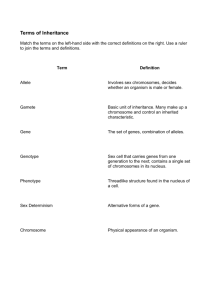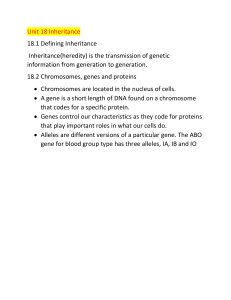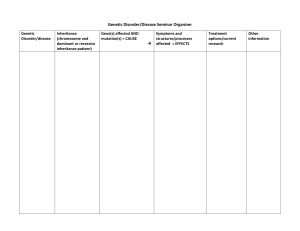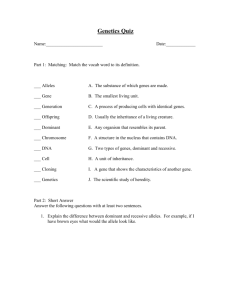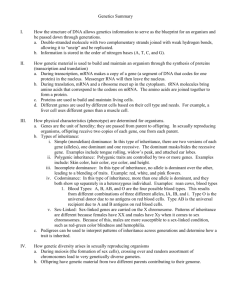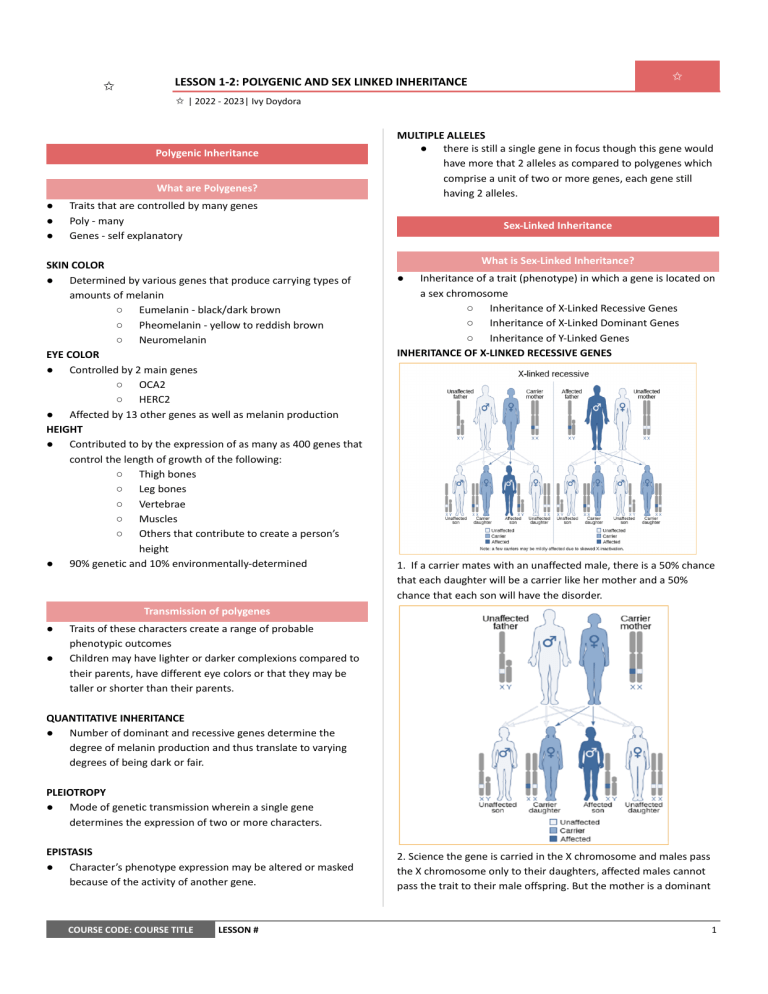
✩ ✩ LESSON 1-2: POLYGENIC AND SEX LINKED INHERITANCE ✩ | 2022 - 2023| Ivy Doydora Polygenic Inheritance What are Polygenes? ● ● ● MULTIPLE ALLELES ● there is still a single gene in focus though this gene would have more that 2 alleles as compared to polygenes which comprise a unit of two or more genes, each gene still having 2 alleles. Traits that are controlled by many genes Poly - many Genes - self explanatory SKIN COLOR ● Determined by various genes that produce carrying types of amounts of melanin ○ Eumelanin - black/dark brown ○ Pheomelanin - yellow to reddish brown ○ Neuromelanin EYE COLOR ● Controlled by 2 main genes ○ OCA2 ○ HERC2 ● Affected by 13 other genes as well as melanin production HEIGHT ● Contributed to by the expression of as many as 400 genes that control the length of growth of the following: ○ Thigh bones ○ Leg bones ○ Vertebrae ○ Muscles ○ Others that contribute to create a person’s height ● 90% genetic and 10% environmentally-determined Sex-Linked Inheritance What is Sex-Linked Inheritance? ● Inheritance of a trait (phenotype) in which a gene is located on a sex chromosome ○ Inheritance of X-Linked Recessive Genes ○ Inheritance of X-Linked Dominant Genes ○ Inheritance of Y-Linked Genes INHERITANCE OF X-LINKED RECESSIVE GENES 1. If a carrier mates with an unaffected male, there is a 50% chance that each daughter will be a carrier like her mother and a 50% chance that each son will have the disorder. Transmission of polygenes ● ● Traits of these characters create a range of probable phenotypic outcomes Children may have lighter or darker complexions compared to their parents, have different eye colors or that they may be taller or shorter than their parents. QUANTITATIVE INHERITANCE ● Number of dominant and recessive genes determine the degree of melanin production and thus translate to varying degrees of being dark or fair. PLEIOTROPY ● Mode of genetic transmission wherein a single gene determines the expression of two or more characters. EPISTASIS ● Character’s phenotype expression may be altered or masked because of the activity of another gene. COURSE CODE: COURSE TITLE LESSON # 2. Science the gene is carried in the X chromosome and males pass the X chromosome only to their daughters, affected males cannot pass the trait to their male offspring. But the mother is a dominant 1 ✩ LESSON 1-2: POLYGENIC AND SEX LINKED INHERITANCE ✩ ✩ | 2022 - 2023| Ivy Doydora homozygote; the daughters will have the normal phenotype but will be the carriers of the mutation. INHERITANCE OF X-LINKED DOMINANT GENES 3. If a carrier mates with an affected male, there is a 50% chance that each child born to them will have the disorder, regardless of sex. Daughters who do not have the disorder will be phenotypically normal carriers of the trait, whereas males without the disorder are free from the defective phenotype and they will not pass the gene onto their offspring. 1. If the mother is affected then the sons will have a chance of being affected, depending on whether a dominant or recessive X chromosome is passed on. When the son is affected, the mother will always be affected. EXAMPLE 2. All fathers that are affected will have affected daughters but not affected sons COURSE CODE: COURSE TITLE LESSON # 2 ✩ LESSON 1-2: POLYGENIC AND SEX LINKED INHERITANCE ✩ ✩ | 2022 - 2023| Ivy Doydora Incontinentia Pigmenti (IP) ● ● Skin abnormalities that evolve throughout childhood and young adulthood. Affected infants have blistering rash at birth and in early infancy and is followed by development of wart-ike skin growth. Hypophosphatemia (vitamin D- resistant rickets) & Hereditary enamel hypoplasia ● ● Enamel is abnormally thin which makes teeth appear small Rapidly wear down to the gums. INHERITANCE OF Y-LINKED GENES ● Mutated gene that causes the disorder is on the Y chromosome. ● Can be passed on from father to son. ● ● ● Hypertrichosis of the ears (conspicuous growth hair on the outside rim of the ears) Webbed toes (between 2nd and 3rd toes) Porcupine man/ichthyosis hystrix gravior (skin thickens and becomes scaly, rough and forms bristle-like outgrowths) COURSE CODE: COURSE TITLE LESSON # 3
